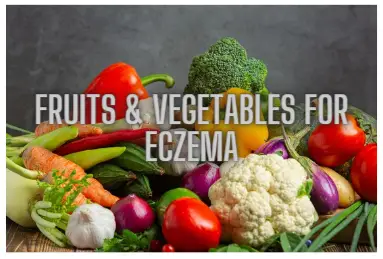Eczema, also known as atopic dermatitis, is a common skin condition marked by red, inflamed, and itchy patches on the skin. While the exact cause of eczema remains unknown, it is widely accepted that the condition is linked to both genetic and environmental factors. Among the environmental factors, diet plays a significant role in the management and alleviation of eczema symptoms. Fruits and vegetables, in particular, are rich in nutrients and antioxidants that can help soothe the skin and reduce inflammation. This article delves into the ways in which a diet rich in fruits and vegetables can benefit individuals with eczema.
Nutritional Powerhouses for Skin Health
Fruits and vegetables are packed with essential nutrients that can promote skin health and potentially ease eczema symptoms. Here’s how these nutrients can help:
Vitamins A, C, and E
Vitamins A, C, and E are vital for skin repair and maintenance. Vitamin A helps in the production of new skin cells and can be found in orange and green vegetables like carrots and spinach. Vitamin C, present in citrus fruits and leafy greens, is crucial for collagen production, which strengthens the skin’s barrier. Vitamin E is an antioxidant that protects the skin from oxidative stress and can be found in avocados and dark leafy vegetables.
Omega-3 Fatty Acids
While not typically associated with fruits and vegetables, omega-3 fatty acids are present in some plant sources like flaxseeds, chia seeds, and walnuts. These healthy fats, when included in salads or smoothies, can help combat inflammation in the skin.
Flavonoids and Carotenoids
Many fruits and vegetables, such as berries, apples, and leafy greens, contain flavonoids and carotenoids, which have anti-inflammatory properties. These compounds can help minimize the body’s inflammatory response, potentially decreasing the severity of eczema symptoms.
Water Content
Hydration is key in managing eczema, as dry skin can exacerbate itching and irritation. Fruits and vegetables like cucumbers, celery, and watermelon have high water content, which can help maintain skin hydration.
The Gut-Skin Connection
The health of the gut microbiome is increasingly recognized as an important factor in the manifestation of eczema. A diet rich in various fruits and vegetables can promote a healthy gut by providing fiber, acting as a prebiotic for beneficial bacteria. Apples, bananas, onions, and garlic are particularly effective at supporting gut balance, which may in turn reduce eczema flare-ups.
Elimination Diets and Eczema Triggers
Eczema symptoms may be triggered by certain foods, though the specific triggers can vary from person to person. An elimination diet, where suspected food triggers are removed and then reintroduced systematically, can be supported by a diet rich in fruits and vegetables, ensuring that one still gets a variety of nutrients while identifying food sensitivities.
Practical Considerations for Incorporating Fruits and Vegetables
For individuals with eczema looking to increase their intake of fruits and vegetables, here are some tips:
- Smoothie Breakfasts: Blend spinach or kale with a mix of berries and a banana for a nutrient-dense start to the day.
- Smart Snacking: Opt for vegetable sticks and fruit slices over processed snacks.
- Colorful Plates: Make half your plate at each meal a variety of colorful vegetables.
- Adventurous Salads: Mix greens, a variety of vegetables, fruits, and seeds for a flavorful and omega-3-rich meal.
- Cook Creatively: Incorporate roasted, steamed, or stir-fried vegetables into your meals.
- Fruit-Based Desserts: Choose fruits for dessert to satisfy your sweet tooth while benefiting from their vitamins and hydration.
Precautions and Sensitivities
While increasing fruit and vegetable intake has many potential benefits for managing eczema, it’s important to be aware of individual sensitivities. Some people may experience allergic reactions to certain fruits and vegetables, particularly if they have conditions like oral allergy syndrome (OAS). Cooking can often prevent reactions in those with OAS, as heat alters the proteins that cause allergic responses.
Final Thoughts
Fruits and vegetables can be a valuable component of an eczema management plan due to their nutrient content, hydration benefits, and anti-inflammatory properties. While they are not a cure, they can support overall skin health and potentially reduce the frequency and intensity of eczema flare-ups. It is important to approach dietary changes cautiously and consider individual food sensitivities. With a thoughtful and balanced diet, individuals with eczema can enjoy the colorful world of fruits and vegetables to not only delight their palate but also to soothe their skin.

